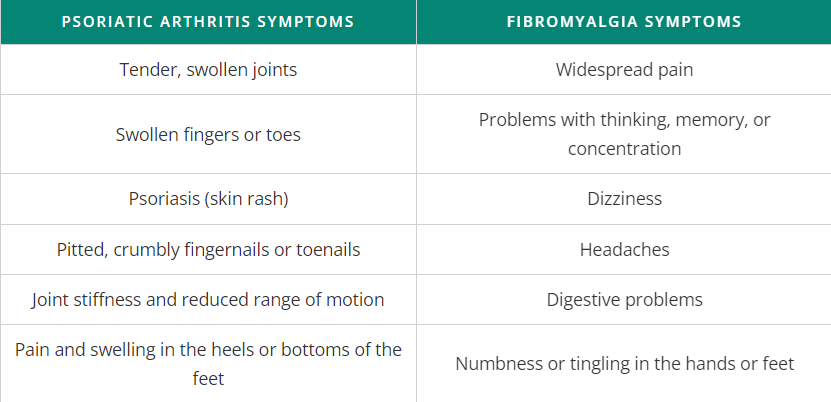
Living with chronic pain and fatigue can be challenging, especially when it’s caused by multiple conditions. If you have psoriatic arthritis (PsA) and experience persistent pain and fatigue, it may also signal the need to be evaluated for fibromyalgia, another chronic disorder. While the two conditions share some symptoms, they require different treatments, making an accurate diagnosis crucial for effective management.
Research suggests that Black individuals may be disproportionately affected by both psoriatic arthritis and fibromyalgia. Studies have shown that Black patients often experience more severe symptoms and have poorer outcomes compared to other racial groups. However, due to underrepresentation in clinical trials and healthcare disparities, the exact impact of these conditions on Black patients is not well understood.
RELATED: Psoriatic Arthritis: Types, Causes, Symptoms & Treatments
Understanding Your Psoriatic Arthritis
Psoriatic arthritis is a condition where your immune system attacks healthy cells and tissues, leading to joint inflammation and the overproduction of skin cells. It affects an estimated 30 percent of the eight million people with psoriasis in the United States, according to the National Psoriasis Foundation. You may experience tender, swollen joints, dactylitis (swelling of a whole toe or finger), and skin or nail symptoms such as dark brown or purple scaly skin psoriasis plaques, or nail changes.
Getting a Diagnosis for Psoriatic Arthritis
There isn’t a specific test for psoriatic arthritis, so doctors rely on a combination of tests to rule out other causes of joint pain and stiffness. These tests may include blood tests, imaging scans (such as MRI or ultrasound), and X-rays. Early diagnosis is crucial to prevent or slow joint damage.
Understanding Your Fibromyalgia
Fibromyalgia is not an autoimmune or inflammatory disease but is believed to involve changes in your nervous system, particularly the brain and spinal cord. It affects about four million adults in the United States, with women being twice as likely to have the condition as men, according to the Centers for Disease Control and Prevention. Symptoms of fibromyalgia include widespread pain, problems with thinking and memory, sleep disturbances, and various other symptoms affecting different parts of your body.
RELATED: Fibromyalgia: What You Need To Know
Getting a Diagnosis of Fibromyalgia
Like psoriatic arthritis, there isn’t a specific test for fibromyalgia. It is mostly diagnosed through a physical exam, lab tests, and X-rays to rule out other conditions. One challenge for rheumatologists is distinguishing between diffuse, widespread pain caused by fibromyalgia and enthesitis from psoriatic arthritis.

The Link Between Your Psoriatic Arthritis and Fibromyalgia
The exact cause of both conditions is unclear, but genetics and environmental factors are believed to play a role. People with inflammatory arthritis like PsA may be at an increased risk for fibromyalgia due to the hypersensitization of your brain to symptoms like pain and fatigue.
The Treatment Approach
Correctly diagnosing both conditions is essential for prescribing the right medications and therapies. While there is no cure for fibromyalgia, medications such as nonaddictive sleep aids, gabapentin, pregabalin, and SNRIs can help manage symptoms. Aerobic and resistance exercises are also important for reducing pain and improving your quality of life with PsA or fibromyalgia.
If you have PsA and experience persistent pain and fatigue, it’s important to be evaluated for fibromyalgia. Both conditions require
The Latest In Psoriatic Arthritis

Psoriatic Arthritis Complications More Likely to be Found in Black Patients

Psoriatic Arthritis vs Psoriasis – What’s the Difference?

Psoriatic Arthritis: 12 Tests You Need to Know About

9 Common Nail Problems That Could Be Psoriatic Arthritis

6 Best Workouts for Sore Joints

Which Psoriatic Arthritis Treatment Is Right For You?
Footer
Where Wellness & Culture Connect
BDO is the world’s largest and most comprehensive online health resource specifically targeted to African Americans. BDO understands that the uniqueness of Black culture - our heritage and our traditions - plays a role in our health. BDO gives you access to innovative new approaches to the health information you need in everyday language so you can break through the disparities, gain control and live your life to its fullest.
Copyright © 2024, BlackDoctor, Inc. All rights reserved.
